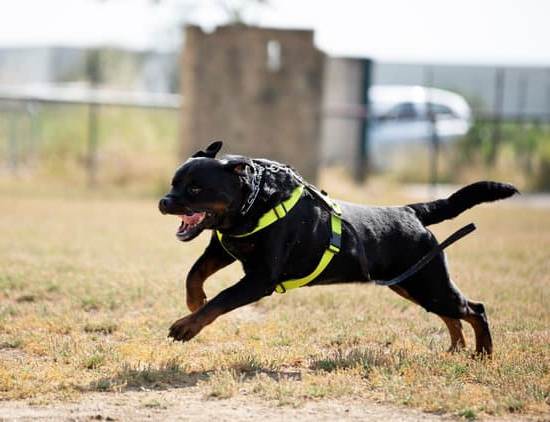If you have ever marveled at the intelligence, loyalty, and protective instincts of police dogs, particularly German Shepherds, you may have wondered how they are trained to become such formidable partners in law enforcement. The training process for these exceptional canines is rigorous and extensive, with specific techniques and methods tailored to harness their inherent abilities.
In this article, we will delve into the world of training German Shepherds like police dogs, exploring the steps involved in transforming these remarkable animals into highly skilled working companions.
Training a German Shepherd like a police dog involves much more than teaching basic commands or tricks. It requires an understanding of their unique breed characteristics, temperament traits ideal for police work, and an insight into specialized training techniques designed to develop their natural abilities.
Whether you are considering training your own German Shepherd as a future police dog or simply want to gain insight into the intricate process behind their training, this article will provide invaluable information on how to unlock the full potential of these extraordinary animals.
Throughout this article, we will guide you through various aspects of training a German Shepherd like a police dog. From selecting the right breed and temperament for police work to laying down a strong foundation of basic obedience training, we will explore each step in detail.
Additionally, we will delve into specific areas such as conditioning and physical training techniques, scent detection development, apprehension and protection skills training, effective positive reinforcement methods, and collaborating with certified dog trainers for optimal results. So let us embark on this journey together and discover what it takes to train a German Shepherd like a true police dog aficionado.
The Ideal German Shepherd
German Shepherds are commonly chosen as the breed for police dogs due to their intelligence, agility, and strong work ethic. However, not all German Shepherds are suitable for police training. It is essential to choose a dog with the right breed characteristics and temperament to ensure success in police work.
When selecting a German Shepherd for police training, it is important to consider factors such as lineage, health history, and working ability. Dogs from proven working lines are usually preferred, as they have been bred specifically for their working abilities and traits that are desirable in police dogs. These traits may include high drives for play, prey, and defense.
Temperament is another crucial factor in choosing a German Shepherd for police training. Police dogs must possess certain temperament traits such as confidence, stability, and courage. They should have a strong desire to please their handlers while maintaining an appropriate level of aggression necessary for police work. It is vital to avoid dogs with fearfulness or aggression towards people or other animals.
To assess the suitability of a German Shepherd for police training, potential candidates can undergo temperament testing. These tests evaluate various aspects of the dog’s behavior such as socialization skills, response to stimuli, and adaptability. Additionally, breeders who specialize in working-line German Shepherds can provide valuable insights into the temperament of their puppies based on their breeding program and previous litters.
Choosing the right breed and temperament is crucial when training a German Shepherd like a police dog. By selecting a dog with the appropriate genetic predispositions and behavioral traits, you lay the foundation for successful police training. Remember that partnering with experienced breeders or trainers can provide valuable guidance in choosing an ideal German Shepherd candidate for police work.
| Factors to Consider | Description |
|---|---|
| Lineage | Dogs from proven working lines are preferred as they have been bred for their working abilities. |
| Temperament | Police dogs require confidence, stability, and an appropriate level of aggression for the task. |
| Health History | Good health is essential for the physical demands of police work. |
| Working Ability | Dogs should exhibit high drives for play, prey, and defense. |
Setting the Foundation
Basic obedience training is a crucial foundation for any German Shepherd that will undergo police training. Before diving into more advanced techniques and skills, it is essential to ensure that the dog has a solid grasp of basic commands such as sit, stay, down, come, and heel. Basic obedience not only establishes control and discipline but also builds trust and a strong bond between the handler and the dog.
One key aspect of basic obedience training for future police dogs is socialization. Police dogs often have to work in various environments with different people, animals, and distractions. Therefore, it is essential to expose them to a wide range of experiences from an early age. This includes introducing them to different environments such as parks, urban areas, busy streets, malls, and public transportation.
In addition to socialization, crate training is another vital component of basic obedience training. Crate training teaches the dog to view their crate as a safe and comfortable space where they can relax and unwind. This skill is particularly important for police dogs as they may spend extended periods in their crates during deployments or when traveling.
Overall, setting a strong foundation through basic obedience training lays the groundwork for success in future police work. It establishes control, discipline, socialization skills, and strengthens the bond between handler and dog. By investing time and effort in this early stage of training, handlers can set their German Shepherds up for success as effective police dogs.
From Puppies to Protectors
Training German Shepherds for police work requires a systematic and well-rounded approach that begins when they are puppies. Starting their training at a young age allows them to develop the necessary skills and behaviors needed for their future roles as protectors and law enforcement partners. This section will explore the different stages of training, from puppyhood to adulthood, and highlight the key aspects involved in shaping a German Shepherd into an effective police dog.
1. Socialization: The socialization process is crucial during the early stages of a German Shepherd’s development. Introducing them to various environments, people, animals, and noises helps them become well-adjusted dogs who are comfortable and confident in any situation they may encounter on the job. Socialization also teaches them appropriate behaviors, such as interacting politely with strangers or remaining calm in crowded areas.
2. Basic obedience training: Building a solid foundation of basic obedience commands is essential for any police dog. Teaching commands such as sit, stay, down, come, and heel not only establishes control but also fosters good communication between the handler and the dog. These commands will be the building blocks for more advanced training later on.
3. Impulse control: It is vital for a police dog to have excellent impulse control to ensure they respond appropriately in high-pressure situations. Teaching them to remain focused even amidst distractions or intense stimuli is crucial. Exercises like “leave it,” where the dog learns to resist grabbing objects or treats without permission, help develop this important skill.
During these early stages of training, it is important for handlers to use positive reinforcement techniques such as treats, praise, and play to motivate and reward the German Shepherd for their correct behavior. Consistency, patience, and clear communication are key components when working with puppies destined for police work.
Remember, training a German Shepherd for police work is a long-term commitment that requires dedication and ongoing reinforcement throughout their development. By starting their training early and providing the necessary foundation, you are setting them up for success in their future role as protectors.
Building Strength
German Shepherds are known for their impressive strength and athleticism, making them well-suited for police work. However, in order to perform at their best, these dogs require proper conditioning and physical training. This section will discuss the importance of building strength in German Shepherds and provide some effective techniques for conditioning their bodies.
The Importance of Building Strength
Building strength is essential for German Shepherds as it enhances their overall performance, endurance, and agility. A strong dog is better equipped to handle physically demanding tasks such as apprehending suspects, tracking down fugitives, or searching through debris. Additionally, a well-conditioned body reduces the risk of injuries and improves the dog’s ability to recover from intense physical activities quickly.
Conditioning Techniques
One crucial aspect of conditioning German Shepherds is structured exercise routines. Regular aerobic exercises like running or swimming can significantly improve cardiovascular health and endurance levels. It is important to start slow and gradually increase the intensity and duration of these exercises to avoid overexertion or strain on the dog’s muscles.
Strength training exercises should also be incorporated to develop muscular power. Activities such as tug-of-war games or pulling weighted sleds can help strengthen the dog’s core muscles and improve their ability to exert force. Furthermore, obstacle courses that include jumps, tunnels, and balance beams can enhance coordination skills and agility.
Nutrition for Optimal Performance
In addition to physical training, providing a balanced diet plays a crucial role in building strength in German Shepherds. High-quality dog food that contains adequate amounts of protein is essential for muscle development. Including supplements like fish oil can help promote joint health while supporting overall wellbeing.
Overall, conditioning and physical training are vital components when preparing a German Shepherd for police work. By following structured exercise routines while focusing on strength and endurance, and ensuring a nutritious diet, dog owners can help their German Shepherds reach their full physical potential. Remember to always consult with a veterinarian or professional dog trainer to ensure the training is appropriate for your dog’s age, health, and individual needs.
Mastering Scent Detection
Scent detection is a crucial skill for any police dog, and it is especially important for German Shepherds who are commonly used in roles such as search and rescue, drug detection, and explosives detection. Their keen sense of smell allows them to locate hidden items or individuals with incredible accuracy. In this section, we will explore the techniques and strategies that can be used to develop the nose of a German Shepherd for scent detection.
One of the first steps in training a German Shepherd for scent detection is introducing them to the target odor. This can be done gradually by using a scent source, such as a specific material or substance, that the dog will learn to associate with rewards.
At first, the scent source may be presented in an open area where the dog can easily find it. As the dog becomes more proficient at locating the scent, it can be hidden in increasingly challenging locations.
To reinforce their ability to detect scents accurately, dogs can also be trained on what is known as a “scent wheel.” The scent wheel consists of multiple containers that each hold a different scent sample. The containers are then spun around so that the dog must use its nose to identify which container holds the target odor. This exercise helps sharpen and refine their olfactory skills.
In addition to specific scent detection exercises, it’s important to provide mental stimulation for German Shepherds undergoing training for this skill. Engaging their minds through puzzles, games, and interactive toys can enhance their ability to focus on scents and improve their overall performance.
Scent Detection Training Tips
| Tip | Description |
|---|---|
| Start with familiar scents | Begin training by using scents that are already familiar to your dog. |
| Gradually increase difficulty | Once your dog becomes proficient at finding scents, start hiding them in harder-to-find locations. |
| Use positive reinforcement | Reward your dog with treats, praise, or play whenever they successfully locate a scent. |
| Consistency is key | Regular and consistent training sessions will help your dog develop its scent detection skills more effectively. |
By following these training techniques and tips, you can greatly improve the scent detection abilities of your German Shepherd. Whether it’s locating missing persons or detecting contraband items, a well-trained German Shepherd can be an invaluable asset in law enforcement and other security roles.
Advanced Training Techniques
One crucial aspect of training a German Shepherd to function as a police dog is teaching them to apprehend and protect. This skill is vital in situations where the dog needs to subdue a suspect or protect their handler. It requires advanced training techniques that go beyond basic obedience commands.
To begin with, it is important for dogs to have a strong foundation in basic obedience training before moving on to more advanced skills like apprehending and protecting. This ensures that they have a solid understanding of commands such as sit, stay, and recall. Once these basic commands are mastered, trainers can then introduce more advanced commands specific to apprehension and protection.
Techniques such as bite work are commonly used in training German Shepherds for police work. This involves introducing the dog to controlled biting exercises using specialized equipment. The trainer typically uses a padded sleeve or bite suit which allows the dog to bite and hold onto without causing harm or injury. Through careful guidance and progressive training, the dog learns how to engage with confidence and control during apprehension scenarios.
Furthermore, training must also focus on teaching the German Shepherd when it is appropriate to use force and when to disengage. Dogs need to be able to differentiate between real threats and non-threatening situations, responding only when necessary under trained command cues from their handler. This level of discernment can be achieved through consistent training exercises that involve simulated scenarios mimicking real-life situations.
The Power of Positive Reinforcement
Effective training methods are essential when training German Shepherds to become police dogs. One highly successful approach is the use of positive reinforcement, which focuses on rewarding desired behaviors rather than punishing unwanted ones. This section will explore the power of positive reinforcement in training German Shepherds and provide some effective methods for implementing this approach.
Understanding Positive Reinforcement
Positive reinforcement involves providing rewards, such as treats, praise, or playtime, to reinforce desired behaviors. This method helps to create a strong bond between the dog and handler while motivating the dog to repeat the behavior that earned them a reward. Unlike punishment-based methods, positive reinforcement builds trust and confidence in both the dog and the handler.
Choosing Appropriate Rewards
When using positive reinforcement with German Shepherds, it’s important to choose appropriate rewards that are highly motivating and appealing to the individual dog. For some dogs, food treats may be the most effective reward, while others may respond more enthusiastically to verbal praise or a favorite toy. Experimentation may be necessary to determine which rewards work best for each dog.
Timing and Consistency
The timing and consistency of rewards are crucial when using positive reinforcement techniques. Rewards should be given immediately after the desired behavior occurs to ensure that the dog associates the reward with that particular behavior. Consistency is also key-rewards should be provided consistently each time the desired behavior is performed to reinforce it effectively.
By utilizing positive reinforcement techniques in training German Shepherds for police work, handlers can build strong relationships with their canine partners while achieving excellent results in obedience and specialized tasks.
Partnering with Professionals
When it comes to training a German Shepherd like a police dog, partnering with professionals can make a significant difference in achieving optimal results. Certified dog trainers have the knowledge, skills, and experience necessary to effectively train and mold German Shepherds into efficient working dogs. This section will explore the benefits of working with certified dog trainers and how they can help unlock the full potential of your German Shepherd.
One of the primary advantages of working with certified dog trainers is their expertise in understanding canine behavior and training methods. These professionals have extensive knowledge of various training techniques that are specifically designed for police work. They understand the unique traits and abilities of German Shepherds and know how to tap into their natural instincts to enhance their effectiveness as working dogs.
Certified dog trainers also provide structured and organized training programs tailored to individual German Shepherds. They assess each dog’s temperament, strengths, and weaknesses to create a personalized training plan that addresses specific needs. Whether it’s obedience training, scent detection, apprehension, or protection work, these professionals have the expertise to develop a customized training regimen that maximizes your German Shepherd’s potential.
Furthermore, certified dog trainers provide guidance and support throughout the entire training process. They offer valuable advice on handling techniques, reinforcement strategies, equipment selection, and more. Their experience working with different breeds and temperaments enables them to adapt their training methods based on your German Shepherd’s responses and progress.
To ensure successful results when partnering with a certified dog trainer for police training, it is important to choose someone who specializes in working with German Shepherds or police dogs specifically. Look for reputable trainers who are certified by recognized organizations such as the National Association of Canine Scent Work (NACSW) or similar professional bodies.
Conclusion
Training a German Shepherd to become a police dog requires dedication, knowledge, and the right techniques. With the proper training and conditioning, these intelligent and loyal animals can reach their full potential as protectors in law enforcement.
In this article, we have explored various aspects of training a German Shepherd like a police dog, from choosing the right breed and temperament to advanced training techniques. By following these guidelines and working with certified dog trainers, you can unleash the full potential of your German Shepherd as a police dog.
The first step in training a German Shepherd like a police dog is selecting the right breed and temperament. German Shepherds are known for their intelligence, trainability, and protective instincts, making them an excellent choice for law enforcement work. It is important to assess the individual temperament of each dog to ensure they have the necessary qualities for police training.
Next, basic obedience training lays the foundation for future police work. Teaching commands such as sit, stay, come, and heel are essential for control during operations or in potentially dangerous situations. This level of obedience builds trust between the handler and the dog.
As the German Shepherd progresses in their training journey, physical fitness plays a crucial role. Conditioning exercises help develop strength, stamina, agility, and endurance. Regular exercise combined with mental stimulation keeps their skills sharp and improves overall performance.
Developing scent detection abilities is another important aspect of training a German Shepherd for police work. These dogs have an exceptional sense of smell that can be honed to detect drugs, explosives, or even missing persons. Utilizing scent detection exercises from an early age helps build upon their natural abilities.
To further enhance their capabilities as apprehending agents, advanced training techniques teach German Shepherds to safely restrain suspects while protecting their handler or responding to threats confidently. This level of training must be conducted carefully by professionals to prevent any harm to participants or unnecessary aggression from the dogs.
Throughout this entire process, positive reinforcement is a powerful tool in training German Shepherds. By rewarding desired behaviors and using treats, praise, or play as motivation, the dogs develop a positive association with their work and are more likely to perform tasks effectively.
Lastly, partnering with certified dog trainers is highly recommended to ensure that the training program is consistent, effective, and tailored to the specific needs of your German Shepherd. These professionals have the expertise and experience to guide you through every step of the training process.
In conclusion, training a German Shepherd like a police dog requires careful planning, commitment, and patience. By following the outlined techniques and working closely with certified trainers, you can unlock the incredible potential of your German Shepherd as a loyal and skilled protector in law enforcement. With dedication and structured training methods, these dogs can become exceptional assets in ensuring public safety.
Frequently Asked Questions
Can you train a German Shepherd like a police dog?
It is possible to train a German Shepherd like a police dog, as they are one of the most commonly used breeds in law enforcement. However, it is important to note that not every German Shepherd will have the same level of abilities or instincts required for police work. To train a German Shepherd for police work, you would need extensive knowledge and experience in dog training techniques and the specific tasks that police dogs perform.
This often includes obedience training, scent detection, patrol work, and apprehension techniques. Consistency, positive reinforcement, and patience are key when training any dog to mimic the behaviors of a police dog.
How do I train my dog to be like a police dog?
Training your own dog to be like a police dog can be challenging but not impossible. The first step is to ensure your dog has a solid foundation in basic obedience commands such as sit, stay, come, and heel. Once your dog has mastered these commands, you can gradually introduce more advanced training exercises such as scent detection or tracking.
It is crucial to use positive reinforcement techniques such as treats or praise whenever your dog correctly performs a desired behavior. Consistency and repetition are essential during training sessions to reinforce the desired behaviors. Additionally, seeking guidance from professional trainers who specialize in working or sport dogs can greatly enhance your chances of success.
How do I train my German Shepherd to protect me?
Training a German Shepherd to protect you requires a layered approach that focuses on both obedience and protective instincts. Start by establishing yourself as the pack leader through consistent obedience training and setting clear boundaries with your dog. Teaching your German Shepherd commands like “watch,” “bark,” or “alert” can help develop their protective instinct while also allowing them to differentiate between potential threats and normal situations.
Socialization exercises with both people and other animals can also help prevent fear-based aggression while ensuring overall good behavior from your German Shepherd. It’s important to consult with an experienced trainer who specializes in protection work to ensure both you and your German Shepherd are safe during this training process.

Welcome to the blog! I am a professional dog trainer and have been working with dogs for many years. In this blog, I will be discussing various topics related to dog training, including tips, tricks, and advice. I hope you find this information helpful and informative. Thanks for reading!





